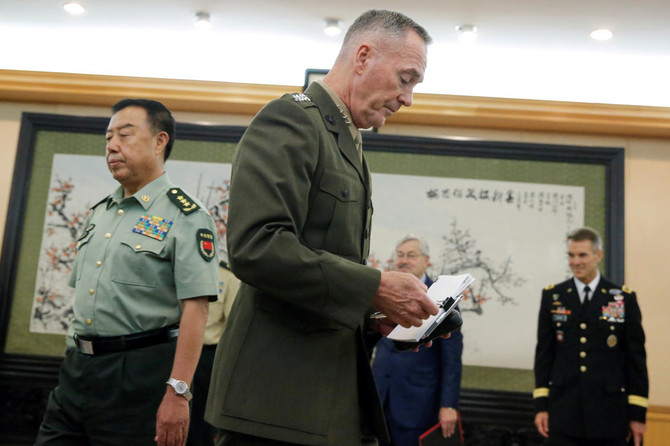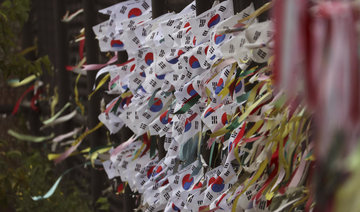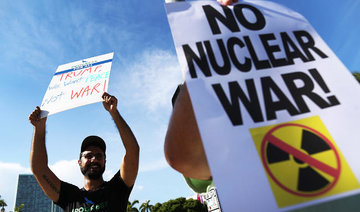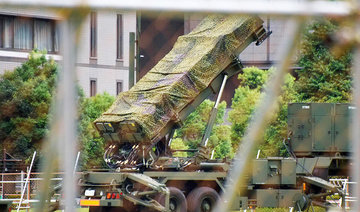BEIJING: A military solution to the North Korean missile threat would be “horrific” but allowing Pyongyang to develop the capability to launch a nuclear attack on the United States is “unimaginable,” the top US military officer said Thursday in Beijing.
The chairman of the US Joint Chiefs of Staff, Marine Corps Gen. Joseph Dunford, told reporters that President Donald Trump directly has “told us to develop credible viable military options and that’s exactly what we’re doing.”
Dunford was responding to questions about Trump’s chief strategist Steve Bannon saying in a new interview that there’s no military solution to the threat posed by North Korea.
“There’s no military solution, forget it,” Bannon told The American Prospect. “Until somebody solves the part of the equation that shows me that 10 million people in Seoul don’t die in the first 30 minutes from conventional weapons, I don’t know what you’re talking about, there’s no military solution here, they got us.”
In Beijing, Dunford said it’s “absolutely horrific if there would be a military solution to this problem, there’s no question about it.”
But, he added, “what’s unimaginable is allowing KJU (North Korean leader Kim Jong Un) to develop ballistic missiles with a nuclear warhead that can threaten the United States and continue to threaten the region.”
Dunford has met with his Chinese counterpart Fang Fenghui, chief of the People’s Liberation Army’s joint staff department. He also met with Fan Changlong, vice chairman of the ruling Communist Party’s Central Military Commission, and Yang Jiechi, China’s top diplomat.
Fan, the Chinese general, told Dunford that Beijing insists military action should be ruled out and “negotiations are the only effective option” in addressing the situation on the Korean Peninsula, according to a statement by China’s defense ministry.
Dunford has been in Asia this week, visiting South Korea, Japan and China.
In Seoul, South Korean President Moon Jae-in said he would consider sending a special envoy to North Korea for talks if the North stops its missile and nuclear tests, in an effort to jumpstart diplomacy.
He also declared, amid fears in South Korea that threats from Trump to unleash “fire and fury” on Pyongyang could lead to real fighting, that there would be no second war on the Korean Peninsula.
“The people worked together to rebuild the country from the Korean War, and we cannot lose everything again because of a war,” Moon said in a nationally televised news conference. “I can confidently say there will not be a war again on the Korean Peninsula.”
Dunford also told reporters in Beijing that “there’s no question” any potential military action in the Korean Peninsula would be taken only in consultation with South Korea.
“South Korea is an ally and everything we do in the region is in the context of our alliance,” Dunford said.
Moon’s comments follow a spike in animosity generated by North Korea’s warning that it might send missiles into waters near the US territory of Guam, and by Trump’s warlike language. Both of the rival Koreas and the United States have signaled in recent days, however, a willingness to avert a deepening crisis, with each suggesting a path toward negotiations.
Trump tweeted that Kim had “made a very wise and well reasoned decision,” referring to North Korean official media saying the leader would not give an immediate order to launch multiple missiles toward Guam.
“The alternative would have been both catastrophic and unacceptable!” Trump wrote.
Next week’s start of annual US-South Korean military exercises that enrage the North each year could make diplomacy even more difficult.
Dunford told reporters that he has advised the US leadership not to dial back on the exercises with South Korea.
“As long as the threat in North Korea exists we need to maintain a high state of readiness to respond to that threat,” he said.
Moon was elected in May after a near-decade of conservative rule that saw animosity deepen between the rival Koreas. Moon wants to engage the North. But his efforts have so far been met with a string of threats and missile tests as the North works to build nuclear-armed missiles that can reach the US mainland.
“A dialogue between South and North Korea must resume. But we don’t need to be impatient,” Moon said.
Moon said he thinks Trump’s belligerent words are intended to show a strong resolve for pressuring the North and don’t necessarily display the willingness for military strikes.
“The United States and President Trump have already promised to sufficiently consult with South Korea and get our approval for whatever option they will take against North Korea,” Moon said.
North Korea’s threats against Guam and its advancing missile capabilities, highlighted by a pair of intercontinental ballistic missile flight tests in July, have raised security jitters among many South Koreans who worry that a fully functional ICBM in Pyongyang would force the United States to rethink whether to trade New York or Washington for Seoul in the event of a war on the peninsula.
“I think the North perfecting an ICBM, loading an atomic warhead on it and weaponizing it is a red line. North Korea is nearing a threshold for the red line,” Moon said. Moon didn’t elaborate, but many foreign experts have viewed the North’s possessing a reliable ICBM as a tripwire for potential US strikes.
US: War would be ‘horrific’ but North Korean nuclear capability ‘unimaginable’
US: War would be ‘horrific’ but North Korean nuclear capability ‘unimaginable’

Top Indian university hosts special course on Saudi transformation, Vision 2030

- Indian Ministry of Education-sponsored program will take place at Jawaharlal Nehru University on Jan. 20-25
- Key speaker will be Prof. Joseph Albert Kechichian from King Faisal Center for Research and Islamic Studies
NEW DELHI: One of India’s most prestigious educational institutions will host a special course this month about Saudi Arabia’s transformation programs and Vision 2030, as relations between the countries deepen.
The five-day course is organized by Jawaharlal Nehru University in New Delhi in cooperation with the Ministry of Education under the Indian government’s Global Initiative of Academic Networks program to encourage exchanges with the world’s top faculty members and scientists.
Scheduled to start on Jan. 20, the course will be led by Prof. Joseph Albert Kechichian, senior fellow at the King Faisal Center for Research and Islamic Studies in Riyadh, who specializes in West Asian politics and foreign policy, especially of the Gulf region.
About 70 participants, including scholars, professionals and young researchers are expected to attend the sessions, said Prof. Sameena Hameed form the JNU’s Centre for West Asian Studies, who coordinates the course.
“It’s a Ministry of Education program, it’s a highly prestigious ... Saudi Arabia is one of our key partners in the Gulf region, where India has key energy trade investment and remittance interest,” she told Arab News.
“We have about 2 million Indians working there. India and Saudi Arabia are looking at each other with keen interest: How to harness this partnership for mutual development, for trade investment and other educational engagements.”
Saudi-Indian ties have steadily gained prominence over the past three decades, and reached a new level of engagement in 2019, following Crown Prince Mohammed bin Salman’s visit to New Delhi and the establishment of the Strategic Partnership Council.
This foundation set the stage for further collaboration, which gained momentum when Saudi Arabia presided over the Group of 20 largest economies in 2020, followed by India’s presidency of the bloc in 2023. The evolving relationship has not only deepened strategic ties but also fostered cooperation in trade, security, new technologies and regional stability.
The upcoming course at JNU aims to equip the participants with knowledge about key transformation programs underway in the Kingdom under its Vision 2030, and to understand its position at the local, regional and global levels.
“The rapid transformation the Kingdom has gone through under King Salman and Crown Prince Mohammed bin Salman is important and needs greater academic discussions and understanding,” said Md. Muddassir Quamar, associate professor at the Centre for West Asian Studies.
“Vision 2030 promises not only to transform the Kingdom but also set the benchmark for developing societies that are working towards sustainable development with care for people, peace, prosperity and environment. India, in particular, is interested in a peaceful and stable West Asia given its deep and historic relations with the region and its strategic interests in the stability of the region. With Vision 2030 Saudi Arabia is set to take a leap forward in its developmental goals, and India views it as significant in ensuring a stable West Asia.”
British Muslims plan MCB alternatives to represent communities

- New bodies to provide civil, political support to Muslims in UK
- Successive governments have refused to fully engage with established Muslim bodies
LONDON: A number of British imams are in the process of establishing new organizations to represent the UK’s Muslim communities, The Times reported on Saturday.
A series of governments have refused to engage with established Muslim bodies, including the Muslim Council of Britain, creating a “vacuum” between politicians and British Muslims, according to community leaders.
Other groups — such as the Mosques and Imams National Advisory Board, the British Board of Imams and Scholars, and Tell Mama, an organization monitoring Islamophobia — are deemed too small to effectively lobby for or represent the UK’s 3.8 million Muslims.
The MCB represents around 500 mosques, schools and charities in the UK on social issues, but does not issue religious declarations.
The Labour government under Tony Blair had ties with it, but saw those severed in 2009 under Gordon Brown after the MCB’s then-deputy leader signed a declaration that was viewed as a call for violence against the Royal Navy and Israel.
The current Labour government talks to various Muslim groups on an “ad hoc” basis, said Qari Asim, senior imam at the Makkah Mosque in Leeds.
A source told The Times that rather than “simply a new entity to replace the MCB,” a “series of new initiatives” would be established “focused on increasing connection between British Muslims and the British government and trying to better represent and engage British Muslims.”
Another source told the newspaper: “It is a group of people from broad civil society who happen to be Muslim, from lawyers to doctors to economists to accountants.
“It’s a huge community (but) there is a lack of serious engagement (from government) and a whole load of expertise and experience not being tapped into by policymakers and others.”
Sariya Cheruvallil-Contractor, professor in the sociology of Islam at Coventry University, told The Times that the government is “missing a trick” by not engaging with the MCB, warning that there is “a lot of suspicion within Muslim communities of new initiatives.”
UK must weigh repatriating Daesh members in Syria, terror adviser says

- Jonathan Hall KC: ‘It wouldn’t prevent them from potentially being prosecuted for what they’ve done’
- Trump’s counterterrorism adviser has also urged Britain to take back citizens who joined Daesh
LONDON: The UK must consider repatriating British members of Daesh held in Syrian detention camps, the government’s independent terrorism adviser has said.
“Repatriation would not be moral absolution. If someone came back it wouldn’t prevent them from potentially being prosecuted for what they’ve done,” Jonathan Hall KC, the independent reviewer of terrorism legislation, told the BBC.
The incoming Trump administration’s counterterrorism adviser Sebastian Gorka has also urged the UK to follow the US lead and take back its citizens who joined Daesh.
“Any nation which wishes to be seen to be a serious ally and friend of the most powerful nation in the world should act in a fashion that reflects that serious commitment,” Gorka said.
“That is doubly so for the UK which has a very special place in President (Donald) Trump’s heart, and we would all wish to see the ‘special relationship’ fully re-established.”
One high-profile Briton who traveled to Syria to support Daesh is Shamima Begum, who left London as a teenager in 2015.
Her citizenship was stripped in 2019. Foreign Secretary David Lammy has said Begum “will not be coming back to the UK.”
Hall said: “It could be quite a pragmatic decision in the overall interests of national security to bring someone back.
“There is obviously some national security benefit of leaving people there because you don’t have to monitor them.
“On the other hand, there haven’t yet been any attacks in Europe by anyone who has been repatriated in this way and if they are left there ... and then they escape, they would be much more dangerous, actually, to the UK.”
The US and some European countries have repatriated their citizens from Syrian camps. Many have been put on trial and imprisoned.
Lammy said Begum’s case has been reviewed in court and the 25-year-old is “not a UK national.”
Many of the detainees are “dangerous, are radicals,” he told the “Good Morning Britain” show on Thursday.
Opposition leader Kemi Badenoch has also said Begum should not be allowed to return to the UK.
“Citizenship means committing to a country and wanting its success. It’s not an international travel document for crime tourism,” Badenoch said.
IMF chief sees steady world growth in 2025, continuing disinflation

- Georgieva’s comments are the first indication this year of the IMF’s evolving global outlook
- The IMF will release an update to global outlook on Jan. 17, just days before Trump takes office
WASHINGTON: The International Monetary Fund will forecast steady global growth and continuing disinflation when it releases an updated World Economic Outlook on Jan. 17, IMF Managing Director Kristalina Georgieva told reporters on Friday.
Georgieva said the US economy was doing “quite a bit better” than expected, although there was high uncertainty around the trade policies of the administration of President-elect Donald Trump that was adding to headwinds facing the global economy and driving long-term interest rates higher.
With inflation moving closer to the US Federal Reserve’s target, and data showing a stable labor market, the Fed could afford to wait for more data before undertaking further interest rate cuts, she said. Overall, interest rates were expected to stay “somewhat higher for quite some time,” she said.
The IMF will release an update to its global outlook on Jan. 17, just days before Trump takes office. Georgieva’s comments are the first indication this year of the IMF’s evolving global outlook, but she gave no detailed projections.
In October, the IMF raised its 2024 economic growth forecasts for the US, Brazil and Britain but cut them for China, Japan and the euro zone, citing risks from potential new trade wars, armed conflicts and tight monetary policy.
At the time, it left its forecast for 2024 global growth unchanged at the 3.2 percent projected in July, and lowered its global forecast for 3.2 percent growth in 2025 by one-tenth of a percentage point, warning that global medium-term growth would fade to 3.1 percent in five years, well below its pre-pandemic trend.
“Not surprisingly, given the size and role of the US economy, there is keen interest globally in the policy directions of the incoming administration, in particular on tariffs, taxes, deregulation and government efficiency,” Georgieva said.
“This uncertainty is particularly high around the path for trade policy going forward, adding to the headwinds facing the global economy, especially for countries and regions that are more integrated in global supply chains, medium-sized economies, (and) Asia as a region.”
Georgieva said it was “very unusual” that this uncertainty was expressed in higher long-term interest rates even though short-term interest rates had gone down, a trend not seen in recent history.
The IMF saw divergent trends in different regions, with growth expected to stall somewhat in the European Union and to weaken “a little” in India, while Brazil was facing somewhat higher inflation, Georgieva said.
In China, the world’s second-largest economy after the United States, the IMF was seeing deflationary pressure and ongoing challenges with domestic demand, she said.
Lower-income countries, despite reform efforts, were in a position where any new shocks would hit them “quite negatively,” she said.
Georgieva said it was notable that higher interest rates needed to combat inflation had not pushed the global economy into recession, but headline inflation developments were divergent, which meant central bankers needed to carefully monitor local data.
The strong US dollar could potentially result in higher funding costs for emerging market economies and especially low-income countries, she said.
Most countries needed to cut fiscal spending after high outlays during the COVID pandemic and adopt reforms to boost growth in a durable way, she said, adding that in most cases this could be done while protecting their growth prospects.
“Countries cannot borrow their way out. They can only grow out of this problem,” she said, noting that the medium-growth prospects for the world were the lowest seen in decades.
China marks muted 5th anniversary of first Covid death

BEIJING: The fifth anniversary of the first known death from Covid-19 passed seemingly unnoticed in China Saturday, with no official remembrances in a country where the pandemic is a taboo subject.
On January 11, 2020, health officials in the central Chinese city of Wuhan announced that a 61-year-old man had died from complications of pneumonia caused by a previously unknown virus.
The disclosure came after authorities had reported dozens of infections over several weeks by the pathogen later named SARS-CoV-2 and understood as the cause of Covid-19.
It went on to spark a global pandemic that has so far killed over seven million people and profoundly altered ways of life around the world, including in China.
On Saturday, however, there appeared to be no official memorials in Beijing’s tightly controlled official media.
The ruling Communist Party kept a tight leash on public discussion throughout its zero-Covid policy, and has eschewed reflections on the hard-line curbs since dramatically ditching them at the end of 2022.
On social media, too, many users seemed unaware of the anniversary.
A few videos circulating on Douyin — the Chinese version of TikTok — noted the date but repeated the official version of events.
FIRST COVID CASE
And on the popular Weibo platform, users who gravitated to the former account of Li Wenliang — the whistleblower doctor who was investigated by police for spreading early information about the virus — did not directly reference the anniversary.
“Dr. Li, another year has gone by,” read one comment on Saturday. “How quickly time passes.”
There was also little online commemoration in Hong Kong, where Beijing largely snuffed out opposition voices when it imposed a sweeping national security law on the semi-autonomous city in 2020.
Unlike other countries, China has not built major memorials to those who lost their lives during the pandemic.
Little is known about the identity of the first Covid casualty except that he was a frequent visitor to a Wuhan seafood market where the virus is thought to have circulated during the initial outbreak.
Within days of his death, other countries reported their first cases of the disease, showing that official efforts to contain its spread had failed.
China was later criticized by Western governments for allegedly covering up the early transmission of the virus and effacing evidence of its origins, though Beijing has vehemently maintained it acted decisively and with full transparency.
According to the WHO, China has officially reported nearly 100 million Covid cases and 122,000 deaths to date, although the true number will likely never be known.
In 2023, Beijing declared a “decisive victory” over Covid, calling its response a “miracle in human history.”




















